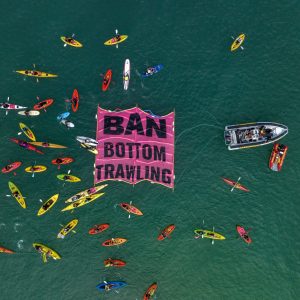The industry’s unwillingness to take observers on board fishing vessels is just the latest in a long line of examples of commercial fishers operating in bad faith and flouting the laws as if they own New Zealand’s fisheries.

Forest and Bird has obtained information under the Official Information Act and say the refusals to take observers onboard is not good enough and LegaSea wholeheartedly agrees, says spokesman Scott Macindoe.
“Whether they’re dumping catch, hiding dolphin fatalities, refusing to allow cameras on boats or, as we’ve seen in this latest round, putting to sea without observers, too many companies and fishers have been unwilling to do what is right by the law, by the fisheries or the people of New Zealand.”
LegaSea has a litany of evidence that paints a stark picture of an industry operating outside its remit and without proper oversight.
“What has become strikingly obvious is the pattern of under-reporting, of hiding the truth, and of senior fisheries managers looking the other way. When evidence comes to light of yet more bad behaviour, MPI, now Fisheries New Zealand, either attacks the messenger, rubbishes the science, works with industry to hide the situation from public view or simply shrugs its shoulders and promises to do more.”
LegaSea is convinced that these issues are ongoing and will only get worse if the commercial fishing industry gains more power over the fisheries and management.
“It is issues such as these that add more nails to the coffin of the Quota Management System. Poor oversight and overallocation just compound our woes. The alternatives to the Quota Management System need to be found now so we can have a robust fisheries management system that provides benefits for all New Zealanders in the future.”
TIMELINE OF EVENTS
May 2018
A major investigation into the fishing industry by Stuff’s investigation team reveals an industry rife with “modern day slavery”.
A leaked report reveals some of the country’s largest fishing concerns have been under-reporting their catch of hoki by hundreds of tonnes.
April 2018
The Environmental Defence Society (EDS) releases a report into the destruction of marine bird life and mammals by commercial fishing interests.
March 2018
The Minister of Fisheries announces a reduction in the number of crayfish that can be taken from the CRA2 region.
December 2017
The government announced changes to the structure of the Ministry for Primary Industries(MPI) which sees the creation of four separate divisions, one of which will oversee Fisheries.
September 2017
The report on cameras on fishing boats, dismissed by Primary Industries Minister Nathan Guy, had been described as “robust” by a top ministry science advisor, emails show.
June 2017
A new leaked MPI report suggests the cameras being installed on boats by the industry-owned business, Trident, won’t have the resolution needed to provide footage able to be used in court.
April 2017
University of Auckland researchers reveal MPI refuses to release information relating to 14 more operations that detail the Ministry’s investigations into reporting and fish dumping.
MPI’s relationship with industry questioned further after it is revealed MPI has outsourced administration and data management for large parts of its daily activity to a company wholly-owned by the fishing industry.
The Ombudsman’s Office has forced MPI to reveal that the legal advice it relied on to avoid prosecuting those industrial fishers filmed dumping fish doesn’t exist and never had.
March 2017
People who dive or fish for crayfish think stocks off the northeast of the North Island are in bad shape, according to a survey.
December 2016
MPI forced to reveal that only four cases of fish dumping have been brought before the courts since 2009.
November 2016
MPI forced to admit that up to 80 percent of the cameras installed on snapper trawlers to police fish dumping failed during their first three months of use. Footage from some vessels has been missing for up to a month.
September 2016
Heron report reveals MPI decision not to prosecute was “flawed”, recommends changes to the way MPI reacts in future. The report also shows MPI was fearful of the reaction by the public and the commercial fishers themselves if they did prosecute.The report also reveals senior MPI managers believe dumping of fish is so widespread half the inshore trawl fleet would go out of business if the law was enforced.
August 2016
Crayfish numbers are so low they are no longer contributing to the ecology of the Hauraki Gulf and are “functionally extinct” according to a marine scientist.
May 2016
University of Auckland’s catch reconstruction report released. New Zealand’s fishery catch of the last 50 years estimated at 2.7 times more than reported. Report attacked by industry as being misleading.
LegaSea respond to the report calling for an urgent review of the QMS and of MPI’s role in overseeing the fishing industry. EDS call for a wider review of NZ’s fisheries management system.
Government appoints Michael Heron QC to review decision not to prosecute those filmed dumping fish. LegaSea says the Heron review is not enough, only a full review of the QMS will be enough to allay public concerns about Ministry capture by the fishing industry.
The catch reconstruction report also refers to MPI’s own investigators’ concerns about the level of fish dumping for the first time.
MPI awards contract to place cameras on boats to monitor for illegal fish dumping and under-reported catch of protected species to Trident, a company wholly-owned by the fishing industry.
LegaSea questions who is running New Zealand’s fisheries and urges the Minister to establish an independent inquiry with broad terms of reference.





